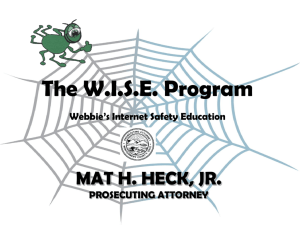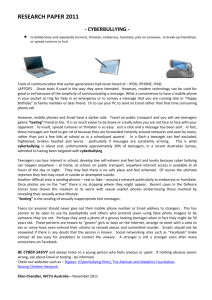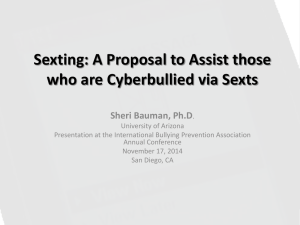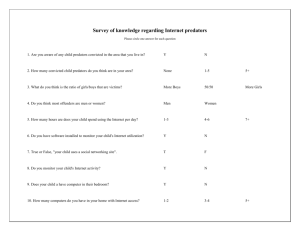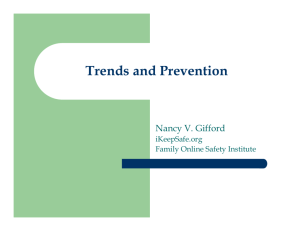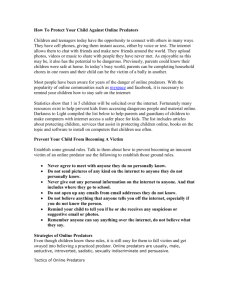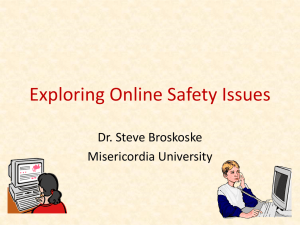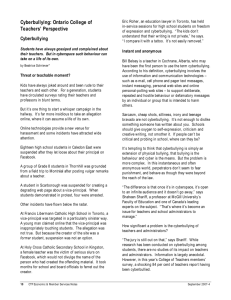TEXTING/Sexting/Computer Safety for Children
advertisement
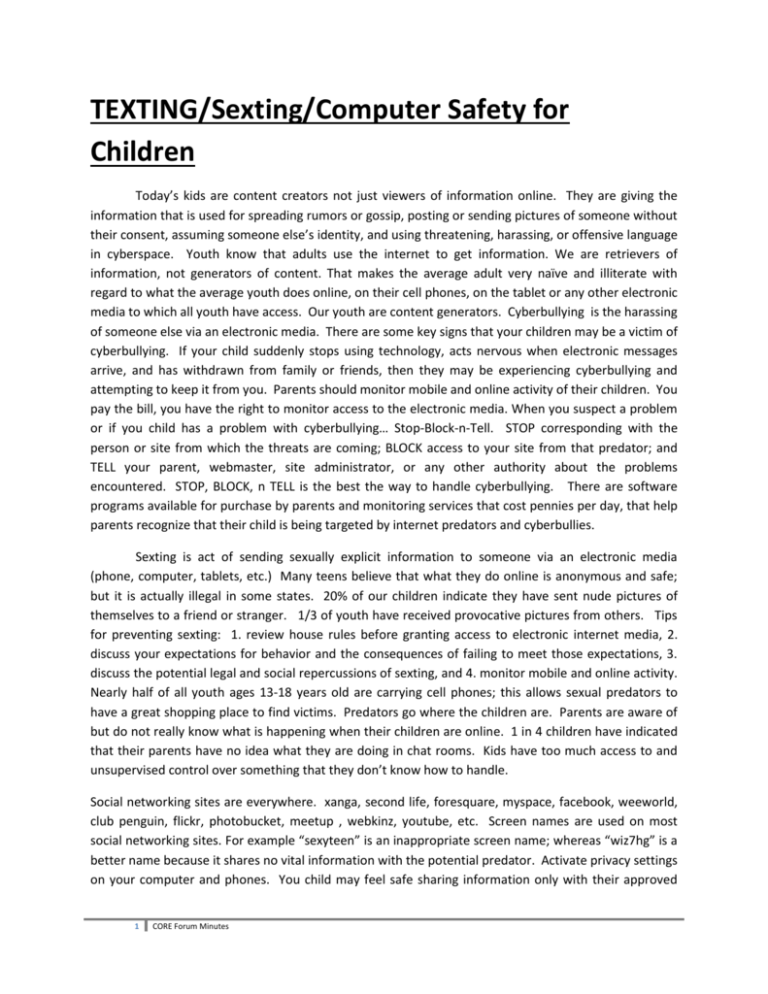
TEXTING/Sexting/Computer Safety for Children Today’s kids are content creators not just viewers of information online. They are giving the information that is used for spreading rumors or gossip, posting or sending pictures of someone without their consent, assuming someone else’s identity, and using threatening, harassing, or offensive language in cyberspace. Youth know that adults use the internet to get information. We are retrievers of information, not generators of content. That makes the average adult very naïve and illiterate with regard to what the average youth does online, on their cell phones, on the tablet or any other electronic media to which all youth have access. Our youth are content generators. Cyberbullying is the harassing of someone else via an electronic media. There are some key signs that your children may be a victim of cyberbullying. If your child suddenly stops using technology, acts nervous when electronic messages arrive, and has withdrawn from family or friends, then they may be experiencing cyberbullying and attempting to keep it from you. Parents should monitor mobile and online activity of their children. You pay the bill, you have the right to monitor access to the electronic media. When you suspect a problem or if you child has a problem with cyberbullying… Stop-Block-n-Tell. STOP corresponding with the person or site from which the threats are coming; BLOCK access to your site from that predator; and TELL your parent, webmaster, site administrator, or any other authority about the problems encountered. STOP, BLOCK, n TELL is the best the way to handle cyberbullying. There are software programs available for purchase by parents and monitoring services that cost pennies per day, that help parents recognize that their child is being targeted by internet predators and cyberbullies. Sexting is act of sending sexually explicit information to someone via an electronic media (phone, computer, tablets, etc.) Many teens believe that what they do online is anonymous and safe; but it is actually illegal in some states. 20% of our children indicate they have sent nude pictures of themselves to a friend or stranger. 1/3 of youth have received provocative pictures from others. Tips for preventing sexting: 1. review house rules before granting access to electronic internet media, 2. discuss your expectations for behavior and the consequences of failing to meet those expectations, 3. discuss the potential legal and social repercussions of sexting, and 4. monitor mobile and online activity. Nearly half of all youth ages 13-18 years old are carrying cell phones; this allows sexual predators to have a great shopping place to find victims. Predators go where the children are. Parents are aware of but do not really know what is happening when their children are online. 1 in 4 children have indicated that their parents have no idea what they are doing in chat rooms. Kids have too much access to and unsupervised control over something that they don’t know how to handle. Social networking sites are everywhere. xanga, second life, foresquare, myspace, facebook, weeworld, club penguin, flickr, photobucket, meetup , webkinz, youtube, etc. Screen names are used on most social networking sites. For example “sexyteen” is an inappropriate screen name; whereas “wiz7hg” is a better name because it shares no vital information with the potential predator. Activate privacy settings on your computer and phones. You child may feel safe sharing information only with their approved 1 CORE Forum Minutes “online friends”; however, a friend can share that information with the entire internet very easily. Parents must make sure that your child’s friends have the same privacy settings on their computers for settings to be effective. Text lingo is a combination of slang and typing shortcuts used when texting. PN11 is a common shortcut for parents are coming. The parent packet has a text lingo worksheet included. Friends: other users which one can socialize with. Many youth think that the more online friends, the better. This is very unsafe. Friends should be people you know with whom one shares similar interest and taste. Don’t collect friends from strangers. It gives access to all the private information what you may have posted online. 70% of kids admit to talking to strangers on the web; 63% have been asked to meet a stranger face to face; 20% have been are solicited for sex. Grooming is the act of befriending, manipulating, and preparing a child so that they will accept inappropriate behavior from a sexual predator. Teach the child to Stop-Block-n-Tell. Predators always take the child’s side and help the youth confide increasingly in them which helps to take away all the child’s insecurities. The overwhelming majority of kids victimized by predators voluntarily meet the predator knowing the predator wants to have sex with them. Talk to your kids about how to deal with unknown friend requests and not responding to unsolicited friend request. Signs that your child is being groomed include: the child is turning away from family or friends, getting upset when they cannot text or get online, spending more time than usual online or texting, minimizing screens or being secretive when texting, accepting calls from unknown telephone numbers, and communicating excessively with unknown friends. See www.cybertipline.com for additional information about cyber-predators. Together build.com is a good social network site where parents and children work together on the web. It helps to teach youth how to properly use the web. Parents should purchase smart tools to help navigate the web safely. Parents must EDUCATE themselves about the technology before they give unsupervised access to their children and use blogs, and other sites to continually update your technoskills. Parents must ENGAGE your kids early and often, sign an internet and mobile safety pledge, be a part of your kid’s digital work even when they resist. Parents must PROTECT their children by using tools to monitor and interact with your kid’s digital world. Parents should SHARE this information with other people that can benefit from this information. FYI: EDUhookups.com is a site for college students to find sexual partners. Just “friending” your child on facebook is not sufficient; there are ways to get around the parent’s watchful eyes. If you are interested in seeing the presentation, contact Elaine Wimberly elainewimberly1@gmail.com 404-312-9958. 2 CORE Forum Minutes
